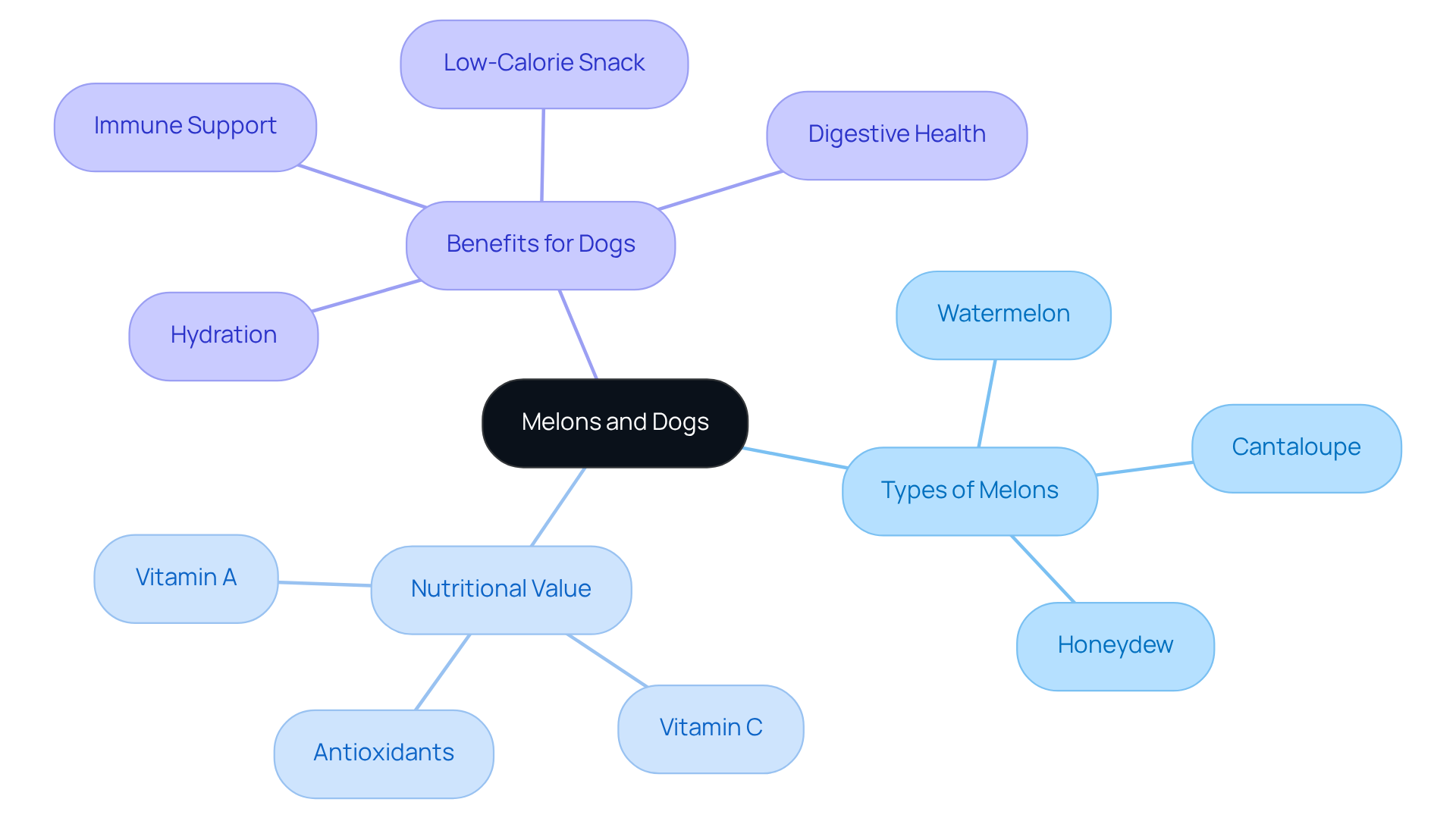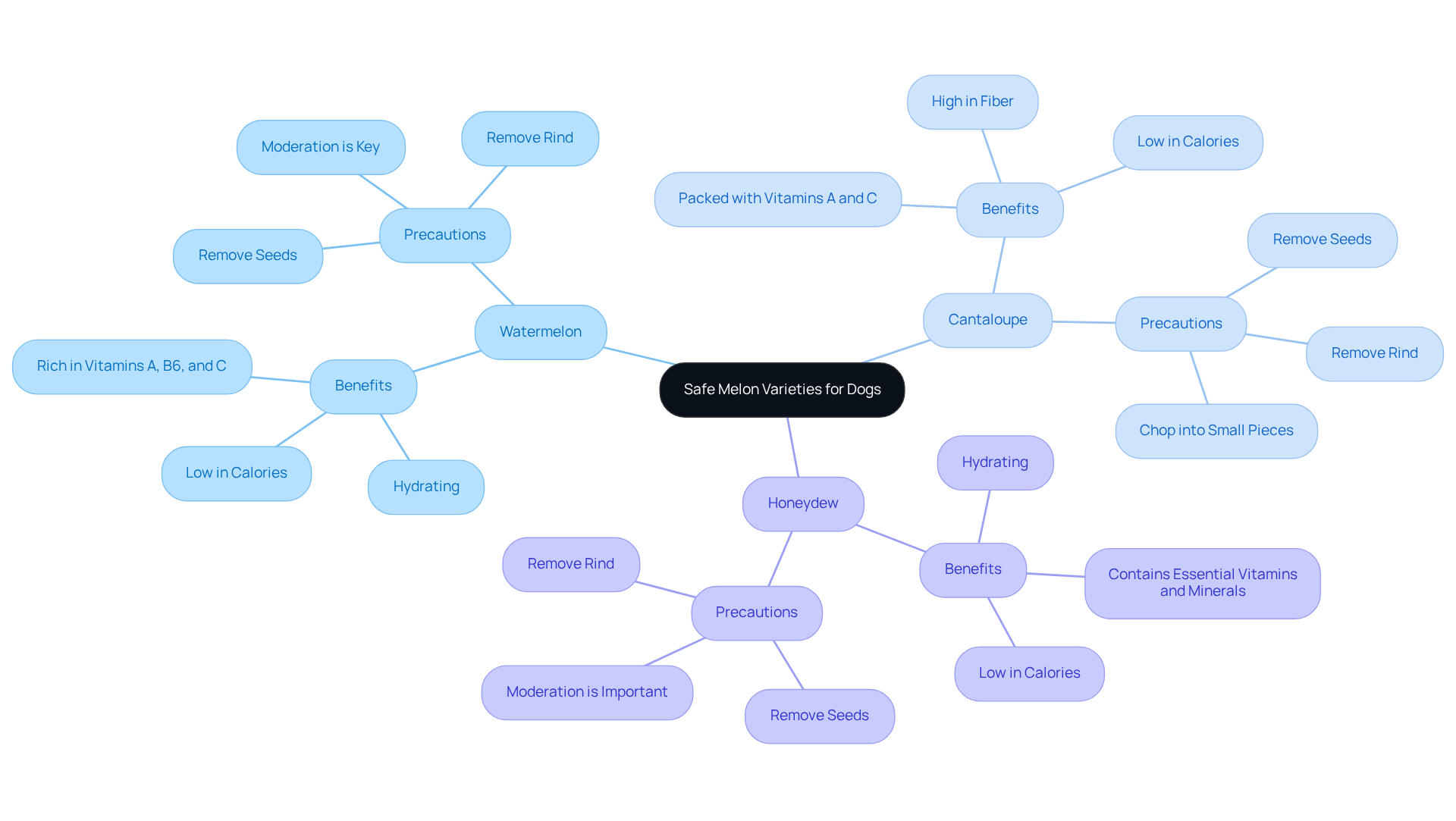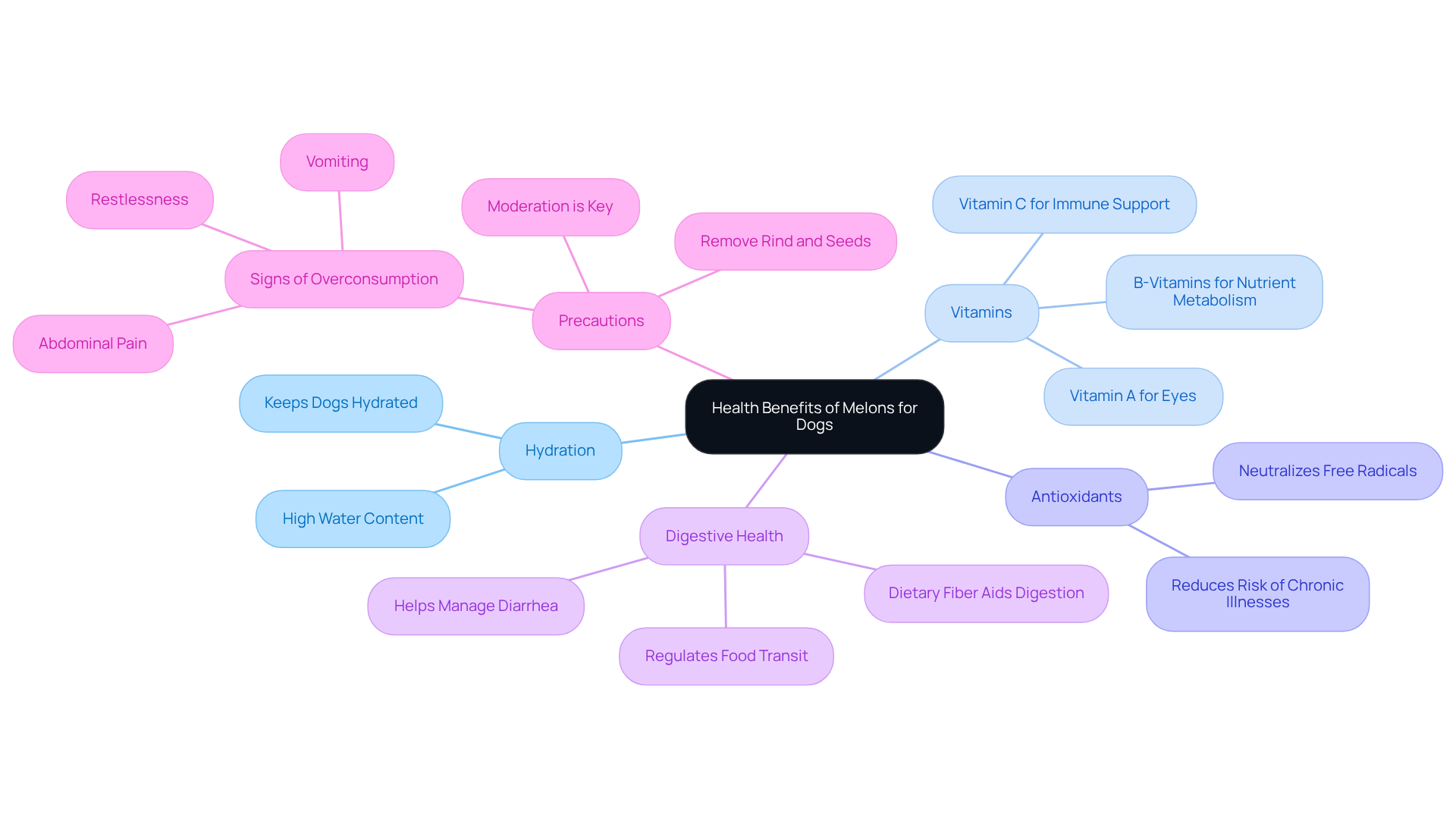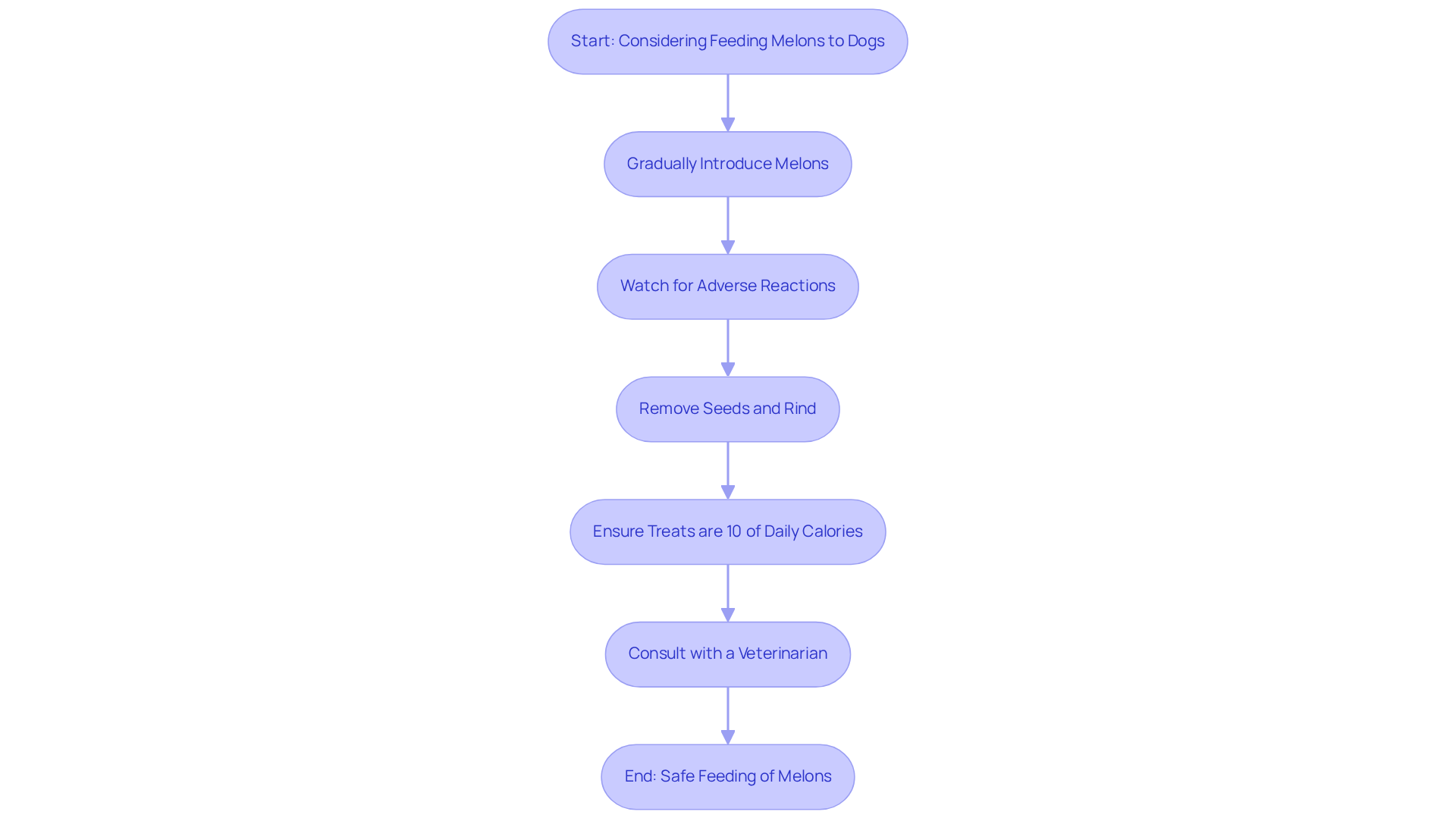Can Dogs Eat Melon? Understanding Safe Varieties and Benefits
Overview
As pet owners, we often seek the best for our furry family members, and that includes their diet. Did you know that certain varieties of melon can be a delightful and hydrating treat for dogs? Watermelon, cantaloupe, and honeydew not only provide essential nutrients like vitamins A and C but also offer a refreshing way to keep your pets hydrated.
However, it’s important to remember that moderation is key. Preparing these melons properly can make all the difference in ensuring a safe treat for your beloved companions. Always remove the seeds and rind to prevent any gastrointestinal issues. By taking these simple steps, you can feel confident that you’re providing a healthy and enjoyable snack.
At Adventure Den, we understand the joy of seeing your pets thrive. Incorporating melons into their diet can be a fun way to bond and share healthy moments together. So, the next time you enjoy a slice of melon, consider sharing a small piece with your pup, and watch their eyes light up with joy. Your commitment to their well-being creates a nurturing environment where they can flourish.
Introduction
The vibrant world of melons offers a refreshing treat not just for humans but for your furry family members as well. Packed with hydration and essential nutrients, varieties like watermelon, cantaloupe, and honeydew can enhance a dog’s diet while providing a delightful snacking experience. However, you may wonder: can dogs safely enjoy these juicy fruits? Understanding the nutritional benefits, safe varieties, and potential risks is crucial for any pet owner looking to share the joy of melons with their beloved companions. As we explore this topic together, it becomes clear that while melons can be a beneficial addition to a dog’s diet, moderation and awareness of safety precautions are key to ensuring their health and happiness.
Define Melons and Their Nutritional Value for Dogs
Melons, a delightful category of produce from the Cucurbitaceae family, includes beloved varieties like watermelon, cantaloupe, and honeydew. These fruits, which can dogs eat melon, are primarily composed of moisture, making them wonderfully hydrating and rejuvenating for your furry family members, especially on warm days. Nutritionally, melons are low in calories yet rich in vitamins A and C, along with antioxidants. These elements can play a vital role in supporting your dog’s immune system and overall well-being.
The high moisture content also promotes hydration, making melons a perfect snack for pets who might not drink enough water throughout the day. Imagine your dog enjoying a refreshing slice of watermelon on a sunny afternoon—what a joyful way to keep them hydrated and a great opportunity to explore the question, can dogs eat melon? By incorporating these fruits into their diet, you’re not only treating them but also nurturing their health. So, why not share the joy of melons with your pets and explore whether can dogs eat melon? They deserve a tasty and beneficial snack that keeps them happy and healthy.

Identify Safe Melon Varieties for Dogs
When it comes to keeping your furry family members happy and healthy, it is essential to know if can dogs eat melon when choosing safe fruit types. Watermelon, cantaloupe, and honeydew are excellent options that not only delight their taste buds but also provide hydration and nutrition, leading to the question: can dogs eat melon? Watermelon, in particular, is a favorite due to its sweet flavor and high water content. Before sharing this juicy treat with your pet, just remember to remove the seeds and rind, particularly if you’re considering can dogs eat melon.
Cantaloupe is another fantastic choice, packed with vitamins A and C, along with fiber to support digestion. Honeydew offers similar benefits, being low in calories and wonderfully hydrating. However, when considering if can dogs eat melon, it’s important to be cautious. Avoid giving your canine any fruit that contains toxic components, such as the seeds of certain varieties or any fruit treated with pesticides or chemicals. Always wash fruits thoroughly before serving them to your beloved pets, particularly if you’re curious about whether can dogs eat melon.
To maintain a balanced diet, it’s important to consider how much of a dog’s daily intake can include melons, as can dogs eat melon only in small portions. As caring pet guardians, it’s crucial to be aware of harmful produce like grapes and cherries, which can be poisonous to dogs. Observing your furry friends for signs of discomfort after enjoying watermelon is essential, particularly when wondering can dogs eat melon, as moderation is key to preventing upset stomachs.
A practical tip to create a nutritious snack is to chop cantaloupe into small pieces and mix it with other healthy fruits and vegetables. This way, you can provide a delightful treat that your pets will love while ensuring they receive the best care possible.

Explore Health Benefits of Melons for Dogs
When considering the health advantages for your furry family members, it’s worth asking if can dogs eat melon, as they make a superb addition to their diet. With their high water content, these fruits raise the question, can dogs eat melon, as they are particularly effective in keeping dogs hydrated, especially during warm weather or after vigorous play. The vitamins A and C found in melons play crucial roles in promoting healthy skin and a shiny coat. Vitamin A is essential for optimal eye function, while vitamin C enhances the immune system, ensuring your pet stays vibrant and healthy.
Antioxidants present in these fruits assist in neutralizing free radicals, potentially reducing the risk of chronic illnesses. Moreover, the dietary fiber in melons aids digestion by regulating food transit and can help manage diarrhea, promoting a healthy gut and regular bowel movements. However, before asking can dogs eat melon, it’s important to remove the rind and seeds, as these can cause gastrointestinal upset.
While these fruits are nutritious, they should be provided in moderation to prevent potential risks such as changes in bowel movements or abdominal discomfort. These combined advantages make melons not only a nutritious treat but also a delightful way to enhance your dog’s overall quality of life. Remember, caring for your pet means understanding their needs and providing them with the best. So, consider adding melons to their diet and observe how they thrive while you wonder, can dogs eat melon?

Understand Risks and Precautions When Feeding Melons to Dogs
While melons can be a nutritious treat for your furry family members, it’s essential to consider if dogs can eat melon and be aware of certain risks and precautions. While these fruits can be delightful, excessive feeding may lead to gastrointestinal discomfort, such as diarrhea and vomiting, primarily due to their high fiber and sugar levels. Additionally, too much fruit can cause constipation, which might escalate into more serious health issues. To ensure a safe experience, you should gradually introduce melons into your dog’s diet while keeping a watchful eye for any adverse reactions, particularly when asking if dogs can eat melon.
Always remember to remove seeds and rind before feeding, as these can pose choking hazards or lead to digestive blockages, particularly when asking the question, can dogs eat melon? Treats, including watermelon, should not exceed 10% of your dog’s daily calorie intake. Consulting with a veterinarian before introducing any new food is crucial, especially for dogs with pre-existing health conditions. As Dr. B. Goldberg wisely notes, “By following the simple precautions outlined above, you can ensure that your furry friend enjoys this juicy fruit safely and without any adverse effects.”
By adhering to these guidelines, you can confidently share the benefits of melons with your beloved pets and know that dogs can eat melon, creating a nurturing environment where they can thrive.

Conclusion
Melons can be a delightful and nutritious addition to your furry family member’s diet, offering hydration and essential vitamins. Understanding which varieties are safe and the potential health benefits they provide is crucial for pet owners who want the best for their companions. By incorporating melons like watermelon, cantaloupe, and honeydew into their pets’ meals, you can enhance their health while ensuring they enjoy a tasty treat.
The nutritional value of melons is impressive, with low-calorie content and high levels of vitamins A and C that support immune function and skin health. It’s important to remember to practice moderation and safety precautions, such as removing seeds and rinds, to prevent gastrointestinal issues. By being aware of the appropriate portions and potential risks, you can confidently introduce melons into your dog’s diet, knowing you are making a loving choice.
Ultimately, sharing the joy of melons with your dog not only provides them with a refreshing snack but also promotes their overall well-being. By following the guidelines outlined, you can ensure your beloved companion thrives while enjoying the delicious flavors of these fruits. Embrace the opportunity to enhance your dog’s diet with melons, and watch them flourish with every juicy bite.
Frequently Asked Questions
What are melons and what varieties are included in this category?
Melons are a category of produce from the Cucurbitaceae family, which includes varieties like watermelon, cantaloupe, and honeydew.
What is the nutritional value of melons for dogs?
Melons are low in calories and rich in vitamins A and C, along with antioxidants, which can support a dog’s immune system and overall well-being.
How do melons benefit dogs’ hydration?
Melons have a high moisture content, making them a wonderfully hydrating snack for dogs, especially on warm days.
Can dogs eat melons?
Yes, dogs can eat melons, and incorporating these fruits into their diet can be a tasty and beneficial snack that helps keep them happy and healthy.
Why are melons a good snack option for pets?
Melons are a good snack option because they are hydrating, low in calories, and provide essential vitamins and antioxidants that contribute to a dog’s health.







